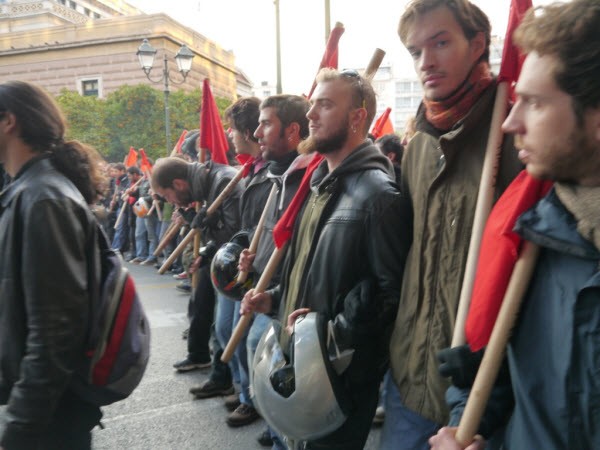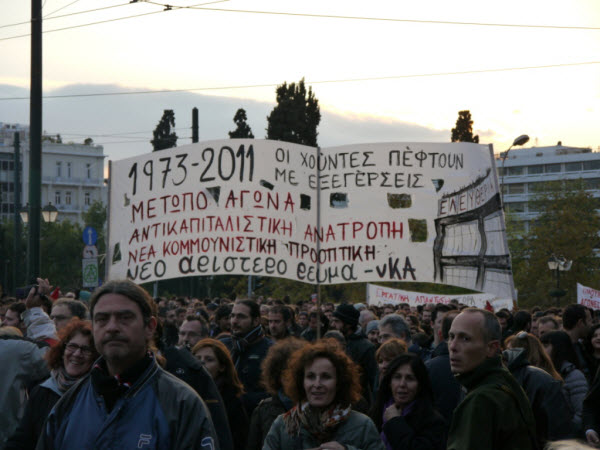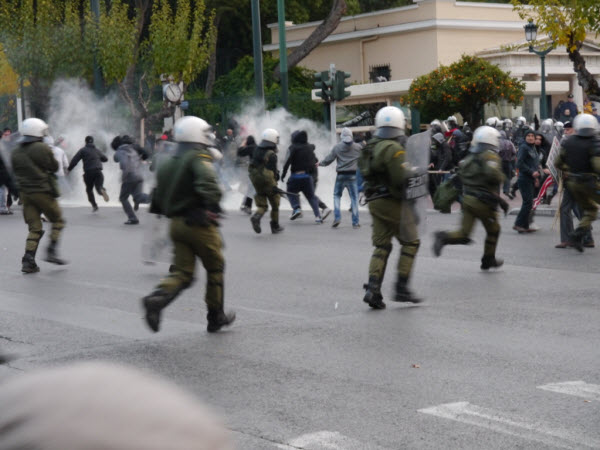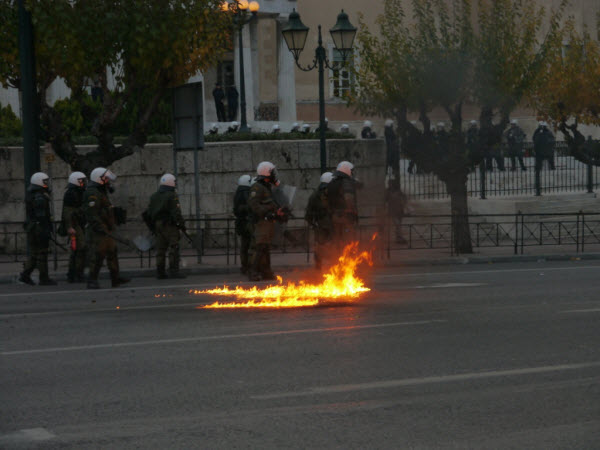We were all moving past the side of Parliament House when the first skirmish started. The main body of the march had long since passed, a sea of red flags moving up the avenue towards the US embassy, the enormous megaphones of the Communist Party and trade union groups, leading the chant.

(Photos courtesy of Guy Rundle)
The anarchists were coming behind. And kept on coming, wave after wave of men and women in black, of all ages, some of the middle-aged ones in beige suits beneath the shroud, anarchism not being an age thing here. They had gas masks. They all had gas masks.
Some of them were professional jobs. Others were no more than hardware shop paint masks, being sold, along with cheap umbrellas, by a couple of Ghanaian immigrants working the crowd.
Behind and around me were the working press and photographers. They all had gas masks. And behind them were phalanxes of riot police, and they all had gas masks. And, of course, gas. It occurred to me then that I may not have used Crikey’s expense account to its fullest advantage.
Later, on Twitter, anarchists would claim that the cops had started the biffo, wading into the black bloc just as they passed the main gates of Parliament. With the best will in the world, that is hard to fully credit, since by that time the Molotov cocktails were arcing through the air.

They landed around and behind the gate, the flames slicking quickly. The riot police near them would probably disagree but they were — as someone, now a parliamentary adviser who had best remain nameless once said to me — unquestionably beautiful.
Then the cops moved in, and there was the flat bang of tear gas canisters, and suddenly the gas masks were up. Those of us without scattered up a side street, avoiding the worst of it, but you could taste the acridity in the throat. No tears though.
As the day went, it was all something of a sideshow. This was November 17, Polytechnia Day, commemorating the attack on a student occupation of the university in 1973. The move, by the Greek junta, left 24 students dead, but spelt the end of the junta.
Since then, November 17 has been a rallying day for the nation. The hard Right doesn’t like it, but even it knew to shut up about it. This year the day comes at an auspicious time, a mere week after the final collapse of the Papandreou government, and his replacement by Lucas Papademos, the former ECB deputy head.

Papademos has a measure of public support, though it has been exaggerated by a degree of push polling — “would you like a banker to run Greece or would prefer to leave the euro and starve to death” sort of thing — but, bizarrely, the deal he has been appointed to push through, has none.
That double whammy threatens to destroy the whole deal in the weeks to come, but form the moment many people are simply glad to be being talked to by someone who isn’t a mainstream politician, for whom trust has gone below zero.
Papademos has gained a degree of support because the collapse of trust had become so total that the process had become dysfunctional. In that sense, support for Papademos represents a rejection of party political government, masquerading as democracy, not a rejection of democracy, or popular rule itself.
It is because what has passed for government in Greece has fallen so far short of anything resembling democracy, has become its opposite, that many see the effective appointment of a banker as a move towards its genuine restoration.
For at its worst, Papademos’s appointment, many feel, restores the most basic level of communicative clarity that is necessary for government at all. Papademos is a banker who can speak to bankers, lacking party political ambition, lacking indeed the will-to-power.
If he is an unquestioning operative of the global financial elite, then at least the agenda is not hidden. For a population that has watched both major parties play a game of brinkmanship right up to the point of default, Papademos is the only figure — aside from the Communists — whose message is not being communicated to them through semaphore via a hall of mirrors.
Yet for the long-suffering Greeks, the structure of the new government in many ways allows the process of opportunistic party politicking to continue. With the two major parties — PASOK and New Democracy — in the cabinet, together with the hard-Right party LAOS, all positioning themselves for the election due in February, the capacity of Greek politicians to take not merely the country but the whole of Europe to the wire is astounding.
Papandreou remains head of PASOK, but there is a desperate desire to remove him — which may have been part of the reason his referendum plan was undermined so sharply. Antonis Samaras, leader of New Democracy, desperate to get himself out from under shared responsibility for putting through the new austerity measures, has been willing to put the whole deal in doubt, in order to create some product differentiation.Both leaders have good reason to try and get some repositioning. Even a decade ago they could split 80% of the vote between them. Now they are running at around 20% for PASOK and 24% for New Democracy. Those who are gaining from this fall are, above all, “none of the above” — a full third of the population say they will explicitly refuse the vote to anyone.
The other parties gaining are from the Left — both KKE, the Communist party, and Syriza, the radical left/eurocommunist group — have raised their vote by more than 50%, the KKE from 7% to 11% and Syriza up to 10%. With other dissident groups breaking away from PASOK, and the small Democratic Left party, the Left could gain close to 25% of the vote.
The KKE would never join government, but Syriza would. They would, however, demand that a new government repudiate the October 26 deal (and earlier austerity commitments), and essentially threaten Europe with crisis — refuse to leave the euro, but refuse to accept the troika’s deal. Germany would then have no alternative but to end its objections to direct lending by the ECB to ease these crises, and Greece could reconstruct itself without crippling interest rates.
One loser from the process has been LAOS, the far-Right party — a split off from New Democracy, which then attracted several fascists from the “Golden Dawn” movement, wanting to go mainstream. LAOS’s entry into government, in pursuit of respectability, appears to have cut it off from support that polls suggested it could have gained, as an anti-systemic party. One leftist said to me that LAOS’s entry to the interim government was “an enormous relief — they lost their chance to become a Le Pen style party”.
None of that is of much import to the Communists, who continue with their insistence that the contradictions of the system cannot be resolved within it, and that the country requires a double whammy — a departure from the euro, and a simultaneous socialisation of the major monopolistic congolomerates, in which media, shipping and construction groups intersect.
However, according to Communist MP Yiannis Ghikas, the most disastrous thing would be an exit from the euro, without any transformation of the system — “that is something that certain sections of capital want, because the value of assets would fall to zero. They have €600 billion of Greek wealth outside of the country, which would come back and buy up the remainder of the country.
Whether the current crisis will be a moment for a new level of political determination remains to be seen. The contradictions have been sharpened, and at the grassroots level across Greece people are resisting the demands for taxes they cannot pay, and cuts they cannot afford.
But there is also a sense of the post-political coming into play. This year, for the first time since democracy was restored, an education minister did not lay a wreath at the sight of the Polytechnic uprising. Papademos chose the moment, having gained 250 votes out of 300, on a confidence measure, to be not in Greece at all, but in Brussels, about a clear a statement as is possible.

So if the troika is smart, they will offer just enough of a deal to the Greek people to gain their consent. That would trade away the country for a generation, but it could be done. However, nothing in their past suggests that this will occur. German political pressures, economic exigencies, and sheer delusional self-regard can be relied on to screw it up.
Amid the drifting tear gas at the entrance to Syntagma Square, the black bloc are doing their best, with the petty weapon of the Molotov. But the real anarchists are in Brussels, and London and DC — powers capable of taking life apart anywhere, and at any level. Compared to those guys, the black bloc are pikers.








Papademos is for all intents and purposes, a US trained and groomed Wall Street banker who has spent more of his life in the US than in Greece. He has close ties to the Rockefeller-Brzezinski created Trilateral Commission (banking and academic syndicate) and other inner elite groups. Monti is a Bilderberger and part of the same clique. If you are planning to take control of Europe I guess you need your own men in there to get the job done properly – not pompous, fatuous politicians as Sarkozy may soon discover.
Both of these banker guys are unelected technocrats just like the guys who got this scam going in the first place. Their goal – a great big Euro bond a la Federal Reserve Treaury Bill program to ensure every country in Europe is swimming in debt up to the eyeballs. You know mortgaging the future until they call in the loan and take over the country with the country’s own money. This used to be a Third World scam but now its gone First World. All the austerity in the world isn’t going to get Europe out of this.
The Irish had the chance to stop this a couple of years ago but were bluffed into voting second time around, for the EU Constitution under fear from the pathetic controlled media and all mainstream Irish politicians that the sky would fall in if they didn’t relinquish their sovereignty by saying yes.
Well the sky has fallen in any way, as many of us knew it would and now as the next part of the plan to destroy sovereign nations unfolds, these same banksters will offer Europe a solution of more debt that will never be repayable and so will begin the European Soviet as Gorbachev described the EU ten years agorun by an elite banking syndicate enjoying legal immunity for anything they may care to perpetrate on the credulous masses..
So it looks to me like its the global criminals versus the anarchists – take your pick. Globalisation is the organised theft of wealth and sovereignty of every country by a banking elite with a complicit political hierarchy in train and to date, an unquestioning police and army according to OWS.
Let’s hope the latter two are still not a done deal. Maybe that’s what Blackwater, sorry Xe and Dyncorp, (Darwin?) are really all about!
Don’t believe me? I leave you with David Rockefeller’s words in his 2002 book “Memoirs”
“For more than a century ideological extremists at either end of the political spectrum have seized upon well-publicized incidents such as my encounter with Castro to attack the Rockefeller family for the inordinate influence they claim we wield over American political and economic institutions. Some even believe we are part of a secret cabal working against the best interests of the United States, characterizing my family and me as ‘internationalists’ and of conspiring with others around the world to build a more integrated global political and economic structure – one world, if you will. If that’s the charge, I stand guilty, and I am proud of it.” David Rockefeller, from his own 2002 book, Memoirs.
Or perhaps author of the Federal Reserve Act, Paul Warburg’s famous statement before the US Senate Feb 7, 1950:
“We shall have World Government, whether or not we like it. The only question is whether
World Government will be achieved by conquest or consent.”
It’s not too late to fix the on-line headline.
Not bffo, try biffo.
I read a while back that it was likely that the US military would become a big earner by acting as an international police force in situations like what is occurring in Greece now. It seemed pretty far fetched then but what will the bankers do when the Greeks inevitably stop supporting the pillaging of their country?
@Bohemian – your ideas intrigue me, and I wish to subscribe to your newsletter.
I think it’s inevitable that inflation is the only way out of this mess. The ECB will become lender of last resort and we will see global inflation run rampant (Hell, we’ve seen it in the US for 2 straight years now, and there will be a 3rd and a 4th ad nauseum) until we’re inflated away and the debts grow ‘smaller and smaller’ until they don’t matter.
I would rather see this Financial mess happen though, than a repeat of WW2. What scares me most is the uprising up ultranationalist governments through all of this screaming ‘We need to close our borders and restore our jobs’.
And destroy (insert social minority/underclass/foreigners here) as they are the root of our problems.
Can anybody tell me how many alumni of Goldman Sachs are now in control of or few steps from the centre of power of the western countries? We have Monti in Italy, our opposition leader in waiting, the cabal in Washington so who else have I missed?